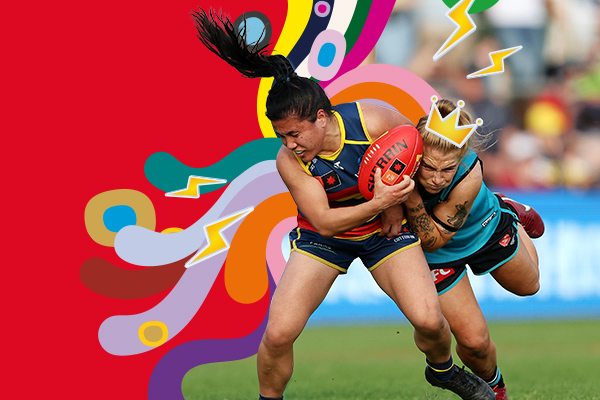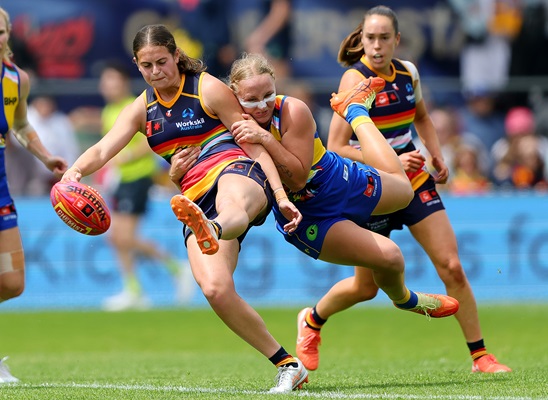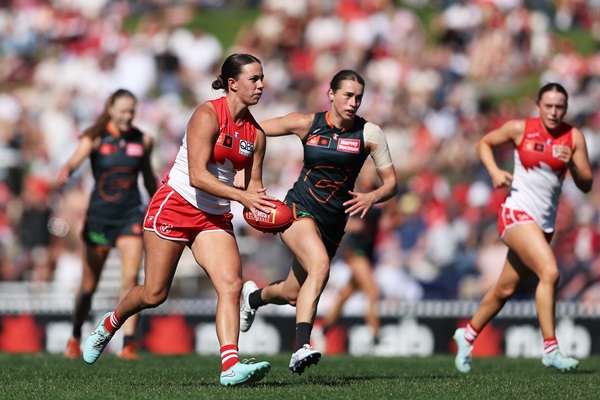-
Medibank is a proud health partner and superfan of the AFLW.
Bonnie Toogood is a force on the football field. At 5-foot-10, the Essendon AFLW captain and key forward commands attention. To spectators, her physical power is clear in every run, mark and goal. But brilliance under stadium lights is only part of the story. Beyond the roar of the crowd, Toogood tackles quieter battles. The pressures of leadership, the complexities of playing in an evolving game and the everyday struggles that can shadow anyone’s path. Facing those demands takes more than skill or practice, it requires mental fitness. And for Toogood, training her mind is every bit as important as hours in the gym.
“Mental fitness, for me, is about having the tools to stay grounded and balanced no matter what comes your way,” she says. “As an athlete, you’re going to face adversity and ride incredible highs. It’s about building a toolkit you can draw on in any moment life throws at you.”
Reframing setbacks
Recent setbacks, including an injury last season and a two-week suspension this year, have tested that toolkit. “You’re not out there kicking the footy or doing what you love, and that can feel defeating” she admits. But after giving herself time to feel disappointed, she ‘reframes'. “I think about what I can do, not what I can’t.” That mindset meant showing up for her teammates, even from the sidelines. “I knew my impact on the people around me. I needed to show up so when my teammates ran out, they felt confident.”
Showing up on hard days
Showing up, even when you don’t feel like it, is a theme she returns to often. Leadership, she says, is as much about lending energy to others as it is about kicking goals. And when motivation falters, she’s not afraid to lean on her support network too. Asked if she ever has days when she’d rather stay under the doona, she doesn’t hesitate. “Of course.” On those mornings, she breaks the process into small steps, drink water, pull on runners, open the front door, and celebrate each as a tiny win. Other times, she’ll text a teammate. “Need a hand today. Can we do this together?”
The power of connection
Connection, she believes, is a cornerstone of mental fitness. At home, that means evenings with her partner, chats with her mum or visits to her Nonna, who never asks about stats or scores. “She just says, are you hungry?” she laughs. “She doesn’t care about the game, and that helps keep me grounded.” Inside the club, connection is just as critical. “The power of your network is huge,” she says. “Get to know people beyond small talk. It creates a safe space and that’s a superpower.”
Being an open book
Toogood is a self-described ‘open book'. She finds speaking honestly about disappointment, pressure or doubt releases the weight before it hardens into something heavier. Bottling things up, she says, only isolates you, sharing fosters deeper connection. That openness isn’t just for teammates or family, it’s part of her mental fitness toolkit. And if sharing her tools helps even one person, she says, it’s worth it.
Bonnie’s morning RITUAL
Bonnie's toolkit has been built piece by piece over the years through trial and error. Podcasts and books feed her thinking, while conversations with coaches and sports psychologists spark new strategies. From that experimentation came her morning routine, RITUAL:
- R: Rehydrate - start the day with water.
- I: Ingest protein.
- T: Take her supplements.
- U: Unlock - practice mindfulness, journaling, or breathwork.
- A: Activate - train or take a walk.
- L: Log wellness - a daily check-in shared with the club.
“It sounds small,” she says, “but ticking that off each morning sets me up. If I start skipping it, that’s my cue I’m overwhelmed.”
Breathwork and resetting
Breathwork is another tool she uses to reset. During her suspension, a sports psychologist asked her to relax her stomach. She hadn’t realised her core was locked with tension. A deep breath softened her muscles and shoulders. “It was wild,” she recalls. “I didn’t realise how much I was holding in.”
Being in the present
Off the field, she finds presence in the kitchen. Chopping vegetables or following a TikTok recipe forces her to focus. “You can’t be thinking about too many other things, you’ll burn the chicken,” she says, grinning. Cooking, like footy, demands presence. Presence, in fact, is something she works hard to practice. The AFLW is unpredictable and fast. Miss a goal, and there’s no time to sulk. “The past isn’t going to help you, and the future isn’t either,” she says. “Stay in the present.” That lesson for Bonnie carries well beyond sport and applies to how she handles criticism, injury, or life’s inevitable curveballs.
For younger players, especially the girls watching from the Auskick sidelines, her advice is simple, embrace the joy and the grind. “You can’t lose the joy of what you’re doing,” she says. “Find joy in the hard work. Getting drafted is just the beginning.”
Redefining strength
What AFLW has given her, beyond competition and community, is mental growth. “What I love most is that footy tests you as a human being,” she says. “It pushes you to grow in resilience, connection, discipline, everything.”
And while premiership glory remains a goal, she knows premiership cups aren’t the only measure of strength. Sometimes, it’s the quiet, unseen work too, rehydrating first thing, breathing through tension, or simply phoning a friend that makes an athlete, and a person, truly fit.
READ MORE: How to build your mental fitness
Bonnie Toogood’s mental fitness toolkit


Medibank. Superfans of the AFLW.
Everybody deserves the chance to reach their full potential. That’s why we’ve joined forces with the AFLW as an Official Health Partner, to help tackle the health barriers facing women in sport.


